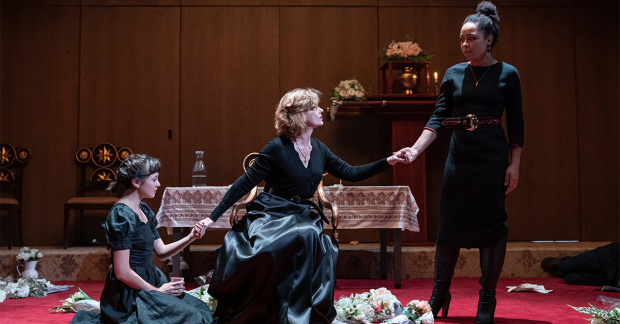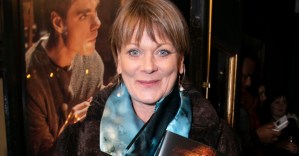Review: Vassa (Almeida Theatre)
Mike Bartlett’s adaptation of Maxim Gorky’s play stars Siobhán Redmond this autumn

© Marc Brenner
Heavy dark blue velvet curtains enclose the stage at the Almeida Theatre. Russian music is playing. A wooden sign announces: "This play is set before a revolution. Capitalism is showing its age." Then the curtains sweep back and Fly Davis's wooden-walled set, with many doors, is revealed.
It has a samovar on the table but the setting is not 1905, when the author, radical socialist and ally of Lenin, Maxim Gorky was briefly imprisoned in Russia after a failed revolution, or even 1910 when he wrote Vassa Zheleznova while living in exile in Capri. It is here, there and everywhere; the characters who burst onto the stage wear almost contemporary clothes.
You can see what is going on here. Mike Bartlett of Doctor Foster fame, who wrote both King Charles III and Albion as premieres at this address, has adapted the Russian original to make it a savage farce about the failure of capitalism in all places and at all times, as told through the prism of one family.
What's fascinating about the Gorky – and this adaptation – is that it has at its heart a matriarch of almost biblical evil. "When the time comes, I'll explain it all to the Virgin Mother and she'll understand," she says at one point. "She pities evil mothers." The source of her warped morality is her absolute determination to save her business at all costs; she says for the sake of her children, but it is hard to know if that's true.
Her husband is dying upstairs, her brother-in-law is trying to take his money out of the failing factory, and her sons also want their share, egged on in the case of the grotesque Semyon by his scheming wife. Her daughter, Anna, on the other hand, who returns home at her mother's request, is willing to cut her own deal; she'll help her mother provided she gets what she wants in return. In order to further her ends, Vassa will stop at nothing, bullying her cowed servants, shouting at her weak and frightened sons, planning to poison the predatory uncle.
Every character on the stage is a grotesque and although the action is often – especially in the early stages – very funny, the mood curdles and darkens as the play progresses. They are tiring people to spend an evening with, for all Bartlett's leavening wit, and the play itself is quite repetitive, making its point about money being the root of all callousness with relentlessly diminishing returns.
Director Tinuke Craig has made some bold decisions; the doors that surround the desk where Vassa sits like a spider at the centre of her web allows a farcical spirit of quick-fire entrances and exits to develop but it also emphasises the way that everyone is listening in to everyone else's business. The sudden switch in the second half to a flower-strewn room of mourning, with the family slumped on chairs around the side, emphasises the way that death and decay are eating away at the structure the family clings to.
But she has some difficulties with the tone and with pacing. There's something unsatisfying about the way the action unfolds; it drifts through a bleak landscape rather than landing its punches. You'd conclude that this has something to do with the fact that Samantha Bond, originally cast to
play Vassa, had to withdraw at the last moment and Siobhán Redmond stepped in. But this theory is undermined by the fact that Redmond gives a performance of monstrous malevolence, roaring through Vassa's exertion of her tyranny, occasionally in moments of quiet revealing the cost.
She gets good support from Arthur Hughes and Danny Kirrane as her greedy, unhappy sons and Michael Gould as the lecherous, anarchic uncle. Alexandra Dowling turns one of the mistreated servants into a figure of genuine pathos. But you have a sense of everyone working very hard to make something fly. Vassa remains resolutely earthbound, not quite funny enough or black enough to make its mark.



















